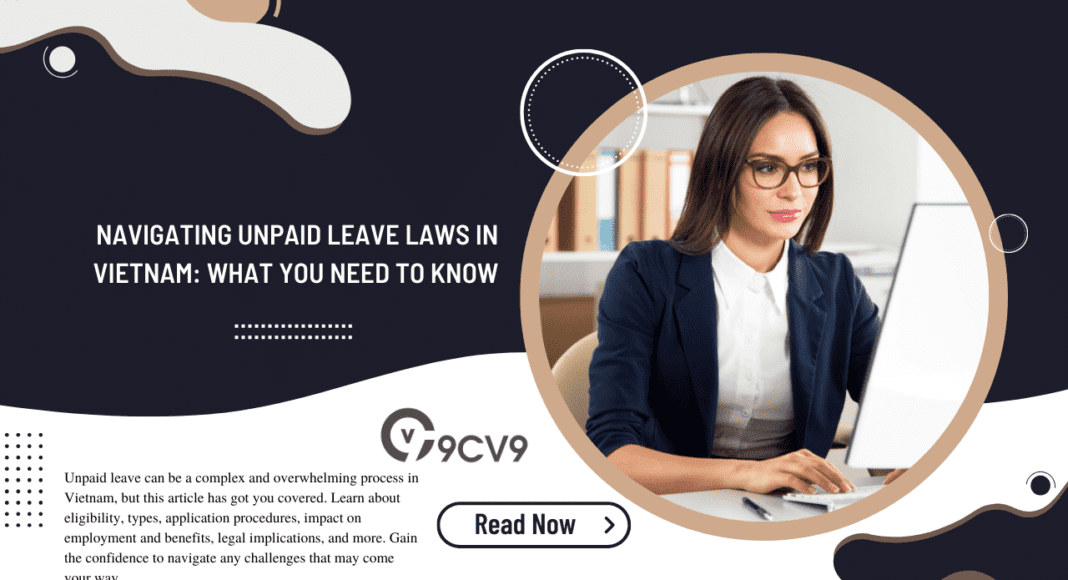Key Takeaways
- Unpaid leave laws in Vietnam can be complex and overwhelming, but understanding the eligibility, types, and application procedures can help you navigate the process with confidence.
- Taking unpaid leave can have an impact on your employment and benefits, so it’s important to be aware of these implications before making any decisions.
- Legal disputes over unpaid leave can be tricky, but understanding the legal implications and seeking professional help can ensure that your rights are protected.
Are you dreaming of taking some time off work to explore the beautiful beaches of Vietnam or indulge in a much-needed shopping spree?
Well, before you start packing your bags, you need to understand the unpaid leave laws in Vietnam, or you might just end up with an unexpected extension of your holiday, without pay.
Navigating unpaid leave laws can be a daunting task, especially in a foreign country.
But fear not, my fellow wanderlusts and workaholics.
In this blog, we will guide you through the ins and outs of unpaid leave laws in Vietnam, so you can take a break without breaking the bank.
Now, I know what you’re thinking.
Unpaid leave?
Who in their right mind would willingly sacrifice their hard-earned money for a day off?
But trust me, taking unpaid leave can be a lifesaver in certain situations.
Maybe you need to take care of a sick loved one, attend a family wedding, or just need a mental health day to unwind from the stresses of work.
Whatever the reason, understanding the unpaid leave laws in Vietnam is crucial for both employers and employees.
So buckle up, grab a cup of coffee (or a traditional Vietnamese phin if you’re feeling adventurous), and let’s dive into the wild world of unpaid leave laws in Vietnam.
Before we venture further into this article, we like to share who we are and what we do.
About 9cv9
9cv9 is a business tech startup based in Singapore and Vietnam with a strong presence worldwide.
With over six years of startup and business experience, and being highly involved in connecting with thousands of companies and millions of jobseekers, the 9cv9 team has listed some important learning points in this overview of how to best take unpaid leave in Vietnam.
If you are looking for a job, we welcome you to apply for a job at 9cv9 now.
Navigating Unpaid Leave Laws in Vietnam: What You Need to Know
- Types of Unpaid Leave in Vietnam
- Eligibility for Unpaid Leave in Vietnam
- Procedure for Applying for Unpaid Leave in Vietnam
- Impact of Unpaid Leave on Employment and Benefits in Vietnam
- Legal Implications of Unpaid Leave in Vietnam
1. Types of Unpaid Leave in Vietnam

When it comes to taking unpaid leave in Vietnam, there are more types of leave than you can shake a stick at (although I wouldn’t recommend shaking any sticks in Vietnam, as it might be seen as disrespectful).
But before that, there are some cases that employees can take leave and still get paid.
According to Article 115 of the Labor Code 2019, these are the situations
- Marriage: 3 days
- Marriage of the employee’s birth or adopted children: 1 day
- Death of the employee’s natural or adoptive father or mother death of the employee’s spouse’s birth or adoptive father or mother, death of the employee’s spouse, or death of the employee’s birth or adopted children: 3 days
These leave are prescribed by law and can be taken in addition to the employee’s normal leave in the course of employment.
For unpaid leave, employees may reach an agreement with the employer to take leave without pay.
From personal leave to study leave, here are the most common types of unpaid leave in Vietnam that you need to know about:
- Personal Leave: Let’s face it, sometimes we all need a day off just to catch up on sleep or binge-watch our favorite TV show. Personal leave is the perfect solution for this. It allows employees to take a short break from work without pay. Just be sure to check with your employer first before booking that last-minute trip to Ha Long Bay.
- Death of the employee’s paternal grandfather or grandmother, maternal grandfather or grandmother, or sibling: According to the Labor Code 2019, employees are entitled to take 1 day off without pay, provided that they notify the employer.
- Marriage of their father or mother, or the marriage of their sibling: According to the Labor Code 2019, employees are entitled to take 1 day off without pay, provided that they notify the employer.
- Sick Leave: Getting sick is no fun, especially when you’re far from home. Luckily, sick leave is available to employees who need time off work to recover from an illness or injury. However, you’ll need a doctor’s note to prove that you’re actually sick and not just trying to extend your holiday.
- Family Responsibility Leave: If you have a sick family member who needs your care or attention, family responsibility leave can give you the time you need to take care of them. This type of unpaid leave is usually limited to a certain number of days per year, so make sure you use it wisely.
- Maternity Leave: For expectant mothers, maternity leave is a must. This type of unpaid leave allows mothers to take time off work to give birth and care for their newborns. In Vietnam, maternity leave is typically 6 months but can be extended in certain circumstances.
- Parental Leave: Dads need time off too. Parental leave allows fathers to take time off work to care for their newborns or newly adopted children. This type of leave is becoming more common in Vietnam, but it’s important to check with your employer to see if it’s available.
- Study Leave: Want to brush up on your Vietnamese language skills or take a cooking class? Study leave allows employees to take time off work to pursue further education or training. Just be sure to get approval from your employer and make sure that the course is relevant to your job.
- Other Types of Leave: In addition to the types of unpaid leave mentioned above, there are other types of leave that may be available to employees in Vietnam. These can include compassionate leave, jury duty leave, and military leave, just to name a few.
Now that you know the different types of unpaid leave available in Vietnam, you can start planning your next adventure (or family emergency) with confidence.
But remember, always check with your employer first and follow the proper procedures for applying for unpaid leave. Happy travels (or caregiving).
2. Eligibility for Unpaid Leave in Vietnam

Eligibility for unpaid leave in Vietnam can be a bit of a mystery, but it’s important to understand if you want to take time off work without pay.
Here’s what you need to know about who is eligible for unpaid leave in Vietnam:
- Employee Qualifications: In general, employees are eligible for unpaid leave if they have been employed by their company for a certain period of time (usually six months to a year). However, this can vary depending on the company’s policies, so be sure to check with your HR department for specific requirements.
- Employer Responsibilities: Employers in Vietnam are required to provide their employees with certain types of leave, such as sick leave and maternity leave. However, employers are not required to provide personal leave or other types of unpaid leave. That being said, many employers do offer unpaid leave as a benefit to their employees.
- Rights and Entitlements of Employees on Unpaid Leave: While on unpaid leave, employees are not entitled to receive any pay or benefits from their employer. However, they are still considered employees and are entitled to certain rights, such as protection from discrimination and the ability to return to their job after their leave has ended.
So, if you meet the qualifications and your employer offers unpaid leave, you’re good to go, right?
Well, not so fast.
Before you start packing your bags for your extended trip to Sapa, there are a few things you need to keep in mind.
Firstly, make sure you follow the proper procedures for applying for unpaid leave.
This may include giving your employer advance notice, filling out the appropriate paperwork, and obtaining approval from your supervisor or HR department.
Secondly, be aware of the consequences of taking unauthorized absences.
If you take time off work without approval, you may face disciplinary action, including termination of your employment contract.
Finally, keep in mind that while unpaid leave can be a great way to take time off work for personal or family reasons, it can also have an impact on your employment and benefits.
For example, taking unpaid leave may affect your entitlements to annual leave or social insurance benefits.
So, if you’re eligible for unpaid leave and decide to take some time off work, make sure you do it right.
Follow the proper procedures, communicate with your employer, and be aware of the consequences.
And most importantly, enjoy your well-deserved break (or family emergency).
3. Procedure for Applying for Unpaid Leave in Vietnam

Applying for unpaid leave in Vietnam can be a daunting task, but fear not, dear reader.
Here’s a step-by-step guide to help you navigate the process:
- Review Your Company’s Policies: Before you start planning your unpaid leave, make sure you review your company’s policies. Each company may have different requirements and procedures for applying for unpaid leave, so it’s important to be familiar with the guidelines.
- Discuss with Your Supervisor: Once you’ve reviewed your company’s policies, the next step is to discuss your plans with your supervisor. Let them know why you need to take unpaid leave and how long you plan to be away from work. They may have questions or concerns, so be prepared to provide as much information as possible.
- Fill Out the Necessary Forms: After you’ve discussed your plans with your supervisor and received approval, you’ll need to fill out the necessary forms. This may include a request for leave form or other paperwork required by your company. Make sure to provide accurate information and double-check for any errors or missing information.
- Submit Your Request: Once you’ve completed all the necessary paperwork, it’s time to submit your request for unpaid leave. This may involve submitting your forms to your supervisor or HR department, so be sure to follow the proper procedures.
- Wait for Approval: After you’ve submitted your request, you’ll need to wait for approval from your employer. This may take some time, so be patient and follow up if you haven’t received a response within a reasonable amount of time.
- Prepare for Your Leave: Once your unpaid leave has been approved, it’s time to prepare for your time away from work. Make sure to tie up any loose ends and delegate tasks to your colleagues to ensure a smooth transition while you’re away.
How to do it in 3 simple steps:
To apply for unpaid leave, your application should consist of the following sections:
- Opening part: This includes the national title and motto, the capitalized and centered title of the resignation letter, and the application reception department.
- Content: This section includes your personal information (full name, date of birth, contact address, position, and working department), the reason and duration of your leave, and any necessary assignment information.
- Closing part: Here, you should include a commitment to complete any pending work at the end of your break, express gratitude, specify the date of your return, and sign the application.
And there you have it, folks.
The procedure for applying for unpaid leave in Vietnam may seem overwhelming, but by following these steps and communicating with your employer, you’ll be well on your way to taking the time off you need.
So go ahead, book that trip to Ha Long Bay, or take care of that family emergency, and enjoy your unpaid leave with peace of mind.
4. Impact of Unpaid Leave on Employment and Benefits in Vietnam
Ah, the impact of unpaid leave on employment and benefits in Vietnam.
It’s a topic that can cause some confusion and concern among employees, but fear not, dear reader.
Here’s what you need to know about the impact of unpaid leave on your employment and benefits:
- Annual Leave Entitlement: Taking unpaid leave can have an impact on your entitlement to annual leave. In Vietnam, employees are entitled to a certain number of days of annual leave based on their length of service. If you take unpaid leave, this may reduce the number of days of annual leave you’re entitled to. According to Clause 4, Article 65 of Decree No. 145/2020/ND-CP, the time you spend on unpaid leave can still be considered as working time to calculate your annual leave days, as long as your employer agrees to it. However, you can’t take more than a month of unpaid leave in a year if you want it to count towards your annual leave days. So, if you’re planning on taking some unpaid time off, make sure to get your employer’s approval first and keep that leave to under a month if you want it to count towards your annual leave days.
- Social Insurance: Unpaid leave may also have an impact on your social insurance benefits. In Vietnam, employers and employees are required to contribute to social insurance, which provides benefits such as healthcare and retirement pensions. If you take unpaid leave, your contributions may be reduced, which could affect your entitlements to social insurance benefits. According to Clause 3, Article 85 of the Law on Social Insurance 2014, you can take a break from paying those pesky premiums. And if you don’t work or receive wages for more than 14 days in a month, Clause 4, Article 42 of Decision 59/QD-BHXH says you don’t have to pay either. So, if you’re planning on taking a long unpaid vacation, just remember: no premiums for you.
- Promotion and Salary Increase: Taking unpaid leave may also have an impact on your prospects for promotion and salary increase. If you take extended periods of unpaid leave, this may be seen as a lack of commitment or productivity, which could affect your chances of being promoted or receiving a salary increase.
- Job Security: Finally, taking unpaid leave may also have an impact on your job security. While employers are required to provide their employees with certain types of leave, they’re not required to provide personal or other types of unpaid leave. If you take unauthorized absences, this may be seen as a breach of your employment contract, which could put your job at risk.
So, what can you do to mitigate the impact of unpaid leave on your employment and benefits?
Firstly, make sure you communicate with your employer and follow the proper procedures for applying for unpaid leave.
This can help ensure that your leave is approved and that you’re aware of any potential impacts on your employment and benefits.
Secondly, consider the timing and duration of your unpaid leave.
If you’re planning to take extended periods of unpaid leave, consider discussing your plans with your employer and exploring alternative options, such as reduced work hours or remote work.
And finally, make sure you’re aware of your rights and entitlements as an employee in Vietnam.
If you have any concerns or questions about the impact of unpaid leave on your employment and benefits, don’t hesitate to reach out to your HR department or a legal professional for advice.
So there you have it, folks.
The impact of unpaid leave on employment and benefits in Vietnam may seem daunting, but with a bit of communication and planning, you can minimize any potential negative impacts and enjoy your well-deserved time off with peace of mind.
5. Legal Implications of Unpaid Leave in Vietnam
Ah, the legal implications of unpaid leave in Vietnam.
It’s a topic that can seem daunting but fear not, dear reader.
Here’s what you need to know about the legal implications of unpaid leave in Vietnam:
- Employment Contracts: Firstly, it’s important to note that unpaid leave is typically only allowed if it’s outlined in your employment contract. This means that if you take unpaid leave without prior approval or if it’s not allowed in your contract, it may be seen as an unauthorized absence and could result in disciplinary action.
- Length of Leave: In Vietnam, employees are entitled to certain types of leave, such as sick leave and maternity leave. If you take extended periods of unpaid leave, this may affect your entitlement to these types of leave. Additionally, if you take more than three consecutive months of unpaid leave, your employment contract may be terminated.
- Social Insurance: Unpaid leave may also have an impact on your social insurance benefits. As mentioned earlier, both employers and employees are required to contribute to social insurance, which provides benefits such as healthcare and retirement pensions. If you take extended periods of unpaid leave, your contributions may be reduced, which could affect your entitlements to social insurance benefits.
- Labour Law: Finally, it’s important to note that unpaid leave is regulated by Vietnam’s labor law. This means that employers must follow certain procedures when granting unpaid leave and employees have certain rights when it comes to taking unpaid leave. If your employer fails to follow these procedures or violates your rights, you may be able to take legal action.
So, what can you do to protect yourself when it comes to the legal implications of unpaid leave in Vietnam?
Firstly, make sure you’re aware of your employment contract and the procedures for applying for unpaid leave. This can help ensure that your leave is approved and that you’re aware of any potential legal implications.
Secondly, make sure you’re aware of your rights as an employee in Vietnam.
This can include the right to take certain types of leave and the right to file a complaint or take legal action if your employer violates your rights.
And finally, don’t hesitate to seek legal advice if you have any concerns or questions about the legal implications of unpaid leave.
A legal professional can help you understand your rights and responsibilities and can provide guidance on how to protect yourself in the event of any legal disputes.
So there you have it, folks.
The legal implications of unpaid leave in Vietnam may seem complex, but with a bit of awareness and preparation, you can navigate these issues with confidence and peace of mind.
Conclusion
Well, there you have it.
You’re now a bonafide expert on navigating unpaid leave laws in Vietnam.
You know the types of unpaid leave, who is eligible, the application process, the impact on employment and benefits, the legal implications, and more.
That’s pretty impressive if I do say so myself.
So let me leave you with a few final thoughts to keep things light-hearted.
If you find yourself needing unpaid leave in Vietnam, just remember:
- Don’t forget to check your employment contract before taking unpaid leave. You don’t want to end up in a sticky situation like a spiderweb in the rain.
- If you’re feeling overwhelmed by the process of applying for unpaid leave, take a deep breath and remember that even the longest journey starts with a single step (or in this case, a single form).
- If you’re worried about the impact of unpaid leave on your employment or benefits, don’t panic! Remember that in life, there are always ups and downs – it’s all about how you handle them.
- And finally, if you do find yourself in a legal dispute over unpaid leave, just remember that justice is blind – but it can still hear your perfectly crafted arguments.
In all seriousness, navigating unpaid leave laws in Vietnam can be complex and overwhelming.
But with the information and tips provided in this article, you’re equipped with the knowledge and confidence to tackle any challenges that come your way.
So go forth and take that unpaid leave.
Whether it’s for a much-needed break, a personal emergency, or just a chance to binge-watch your favorite TV show, you deserve it.
And with your newfound understanding of the laws and procedures, you can do so with peace of mind.
Thanks for reading, and don’t forget to share this article with anyone else who may be navigating unpaid leave laws in Vietnam.
Who knows, you may just be their hero in disguise (or at least their helpful co-worker with a great sense of humor).
If you find this article useful, why not share it with your family and friends and also leave a nice comment below?
We, at the 9cv9 Research Team, strive to bring the latest and most meaningful data, guides, and statistics to your doorstep.
If you are looking for a job or internship, then hop to 9cv9 Modern Job Portal to find the best jobs and internships to kickstart your ideal career path.































![Writing A Good CV [6 Tips To Improve Your CV] 6 Tips To Improve Your CV](https://blog.9cv9.com/wp-content/uploads/2020/06/2020-06-02-2-100x70.png)


